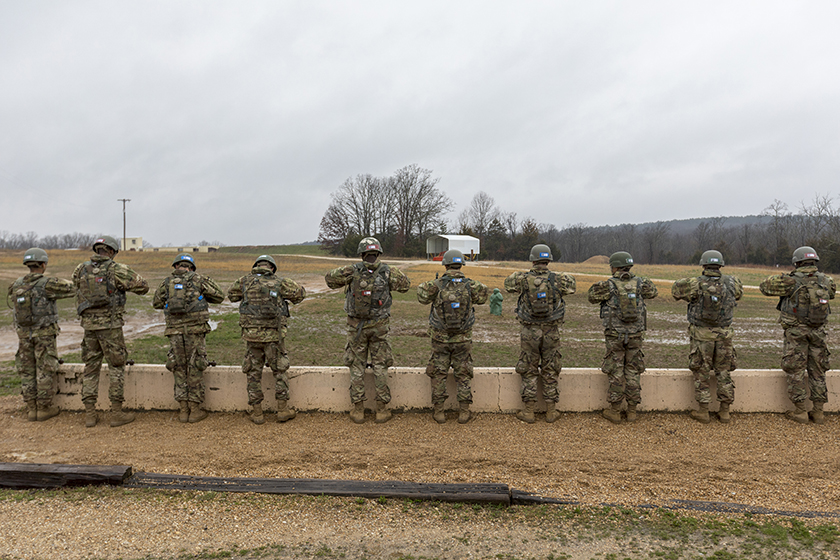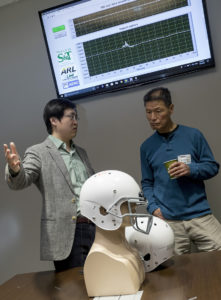S&T, Phelps Health receive $5.1 million to help military address traumatic brain injury
Posted by Andrew Careaga

Army recruits at Fort Leonard Wood, Missouri, training in grenade throwing. Exposure to explosions from hand grenades and other ballistics are linked to traumatic brain injury among soldiers. Photo by Tom Wagner/Missouri S&T, ©2019 Missouri S&T;
Armed with more than $5.1 million in federal funds, researchers at Missouri S&T and Phelps Health are helping the U.S. Army tackle the persistent problem of traumatic brain injury (TBI) among soldiers and recruits.
Funded by the U.S. Army Research Laboratory through the Leonard Wood Institute (LWI), the Army’s research arm at the nearby Fort Leonard Wood post, Missouri S&T scientists and engineers will take a variety of approaches to address the issue. They hope their efforts will help the Army detect TBIs sooner and more accurately, prevent TBIs during basic training, and help the military better understand the causes of brain trauma. Their research could lead to new TBI detection tools for use on the battlefield or in training.
Missouri S&T research projects include a urine test to quickly determine whether a soldier might have a TBI, a sensor-embedded helmet to transmit brain activity to observers, development of a helmet liner to protect the brain against blast waves, and development of antioxidants that could prevent or treat brain trauma.
In all, Missouri S&T has received funding for seven different research projects related to TBI detection and prevention.
A military priority
“Thousands of recruits come to Fort Leonard Wood each year for basic training, and hundreds of those recruits experience TBI during their training,” says Dr. Costas Tsatsoulis, Missouri S&T vice chancellor for research and dean of graduate studies. “Preventing TBI is a priority for the Army, and we have the breadth of research expertise to help.
“In addition to our proximity to Fort Leonard Wood, we have a long-standing relationship with the fort and great familiarity with the community there,” Tsatsoulis says. “We’re grateful for the Army’s support of this truly multidisciplinary approach to help our military address one of its most arduous research challenges.”

Dr. Jie Huang, assistant professor of electrical and computer engineering at Missouri S&T, demonstrates helmets he’s made with fiber optic sensors to Dr. Chiming Huang, associate professor of biological sciences at the University of Missouri-Kansas City, during a recent traumatic brain injury research conclave at the Army base in Fort Leonard Wood, Missouri. Photo by Tom Wagner/Missouri S&T, ©2019 Missouri S&T
Hundreds of thousands of U.S. soldiers suffer from TBI, according to a 2018 report from the Center for a New American Security (CNAS), a Washington, D.C., think tank. “Emerging evidence suggests that servicemembers may be exposed to high levels of blast overpressure (the pressure wave that comes from explosions) when firing heavy weapons,” write Lauren Fish and Paul Scharre in the CNAS report.
Left undiagnosed or untreated, TBI can result in later complications, including dementia, according to a 2018 study published in JAMA Neurology. Moreover, according to the CNAS, U.S. Department of Defense studies show that some soldiers experience cognitive deficits, including delayed verbal memory and visual-spatial memory, after firing heavy weapons.
Missouri S&T received the funding through its participation in the Acute Effects of Neurotrauma Consortium (AENC), which S&T joined in 2018. The consortium includes the LWI, Fort Leonard Wood, Phelps Health (a regional health system based in Rolla) and three other Missouri universities: the University of Missouri-Columbia, the University of Missouri-Kansas City and Washington University in St. Louis.
The Army trains about 85,000 soldiers each year at Fort Leonard Wood, says Dr. Don James, chair of the AENC board of directors and Phelps Health’s senior vice president of research and government affairs.
Of those, some 600 to 800 experience TBI, according to the Army’s estimates, with significant numbers going unreported. Fully 85 percent of all TBIs experienced by troops occur during basic training, he says.
“Missouri S&T is taking innovative approaches to addressing TBI, and we’re very pleased that S&T is part of this consortium,” James says.
A multidisciplinary approach
The projects involve researchers from chemistry, computer engineering, electrical engineering, materials science and engineering, mathematics and statistics, mechanical engineering, and nuclear engineering, as well as researchers from Phelps Health.
Missouri S&T TBI projects funded through the LWI grants and the principle investigators are:
- A $2.25 million grant to develop sensor-embedded “smart helmets” to quickly detect TBI. Dr. Jie Huang, assistant professor of electrical and computer engineering at Missouri S&T, is leading this research project.
- A $1.24 million grant to develop a method to quickly test urine for the presence of proteins and metabolites that may indicate TBI. Dr. Casey Burton, director of medical research at Phelps Health and an adjunct professor of chemistry at Missouri S&T, is leading this project.
- A $412,261 grant to Dr. Paul Nam, associate professor of chemistry, to develop antioxidant therapies and identify oxidative biomarkers for effective diagnosis, prognosis and treatment of TBI.
- A $403,966 grant to Dr. Jie Gao, assistant professor of mechanical engineering, to develop an imaging technique to study TBI or spinal cord injury. The process would involve the use of various spectroscopic techniques to identify damaged brain or spinal tissues.
- A $329,989 grant to Dr. H.K. Lee, associate professor and interim director of nuclear engineering, to develop a real-time computed tomography scan (CT scan) system that would help other researchers better design and test TBI prevention gear.
- A $252,426 grant to Dr. Fatih Dogan, professor of materials science and engineering, to develop a composite material to be used as a helmet liner to shield the brain from blast waves and ballistic impact that occur during training or in combat.
- A $235,194 grant to Dr. Donald Wunsch, the Mary K. Finley Distinguished Professor of Computer Engineering and director of the Applied Computational Intelligence Laboratory, to analyze data from a TBI repository developed by the National Institutes of Health and the Department of Defense. The project involves the use of artificial intelligence (unsupervised learning neural networks) and statistical methods to develop personalized medicine.
While the immediate concern of this TBI research is to address the military’s needs to protect soldiers and recruits, Tsatsoulis sees opportunities beyond military applications. The research could one day help medical personnel detect and treat brain trauma sooner. Because TBI is linked to long-term problems like dementia, Alzheimer’s disease or post-traumatic stress disorder, early treatments of acute brain trauma could prevent future chronic problems, he says.
Most impressive and vitally needed!
Even the helmets in use today may contribute to this problem or other degenerative chronic effects.
We are uniquely situated at MO S&T to help with these issues.
This is wonderful. Makes me proud to be a graduate!